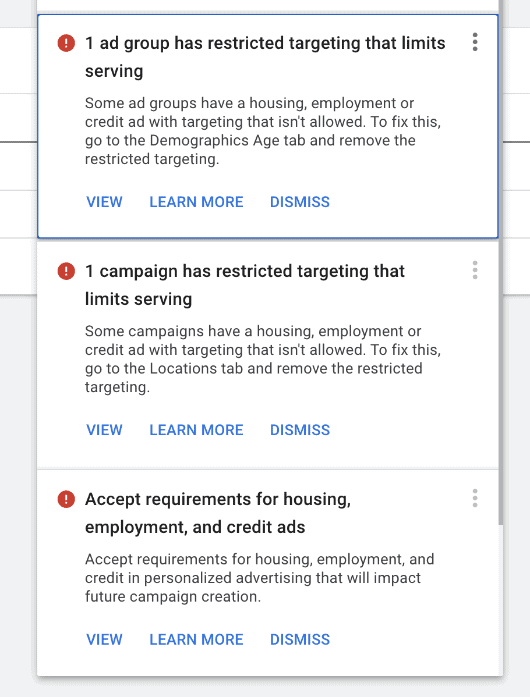Request A Demo
Get a closer look at how we can help you engage with success.
Senior Living
Due to the Fair Housing Google Ads Policy, you’ve likely seen the new restriction in your Google Ads dashboard like the example below.

To prepare for this policy change, there are several options to consider to limit the disruption of senior living marketing programs. One specific way is through the implementation of offline conversion tracking. With offline conversion tracking, marketing teams gain a better understanding of the leads it generates. If you’re unaware of what offline conversion tracking is, or why it’s important, then continue reading.
Offline conversion tracking is a customized integration between Google Ads and data sources like a CRM where offline conversion data is imported and combined with Google Ads campaign data. By importing these datasets into your CRM, senior living providers can tie offline conversion data back to Google Ads campaigns. This allows for providers to optimize future campaigns around this qualified lead data.
Not all conversions happen online. While an ad campaign on Google increases awareness and influences a move in decision, an individual may have several conversations with your staff or other offline interactions before converting. Having full attribution into the resident journey is crucial, but with the pending changes from the Housing, Employment and Credit Policy, it makes offline conversion tracking more important than ever. Offline conversion tracking helps senior living marketing teams determine qualified leads and fill in the gaps of the conversion process.
There will naturally be different demographic segments that fall within a target audience and are more valuable than others. In this instance, it is qualified lead data from a CRM that is being passed back to Google Ads. By feeding this qualified lead data back into Google Ads, Google will be able to use that data to send ads to individuals based on shared demographic characteristics. These shared characteristics could include, but isn’t limited to the following:
…and much more. While senior living marketing teams can’t target or exclude ads being served to audiences based on sensitive demographic data after October 19th, this qualified lead data will help Google serve more targeted ads after the policy change takes place.
Keep in mind, to pass back qualified lead data with Google Ads, a custom integration will need implemented, which is highly dependent on the CRM a community is using.
Implementing a custom integration to share qualified lead data with Google Ads requires a partner to help teams uncover any potential roadblocks in the process. Luckily, our team is helping senior living client partners share useful lead data with Google Ads to prepare for the Housing, Employment and Credit policy update on October 19th. To ensure your community is prepared for this change so its paid campaigns aren’t halted, contact our team. We’ll be happy to answer your questions and help your community implement offline conversion tracking.
Get valuable insights delivered to your inbox